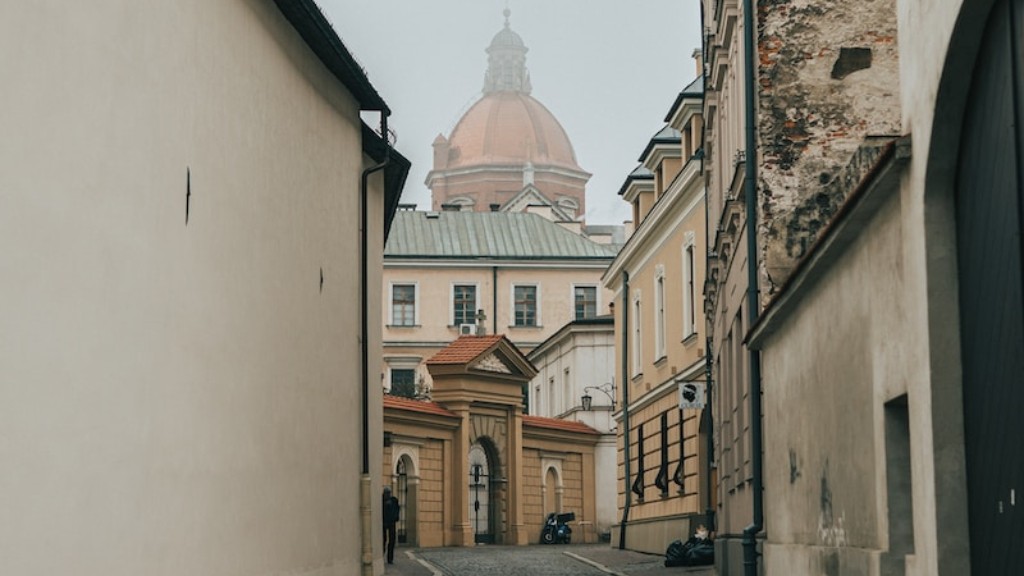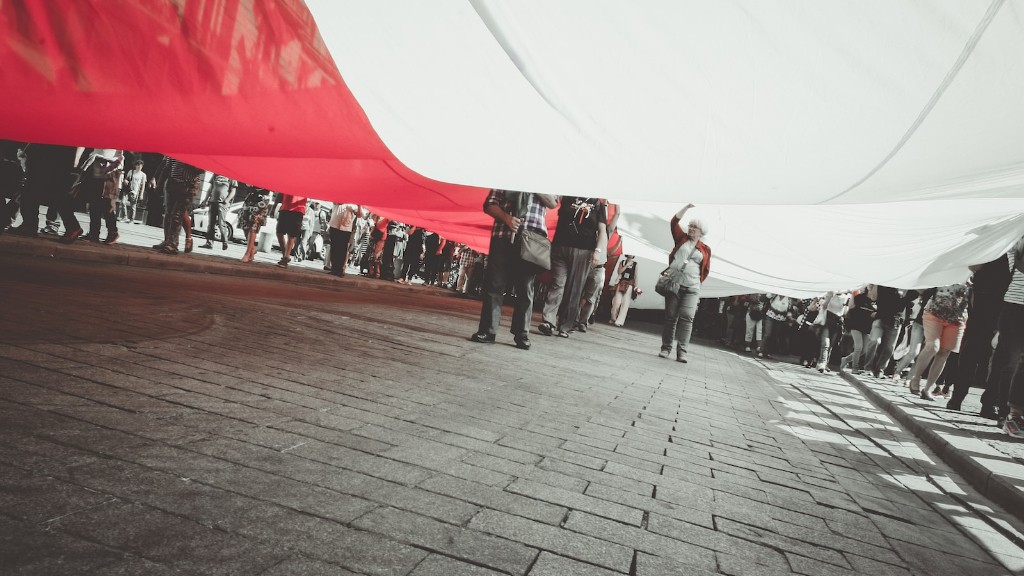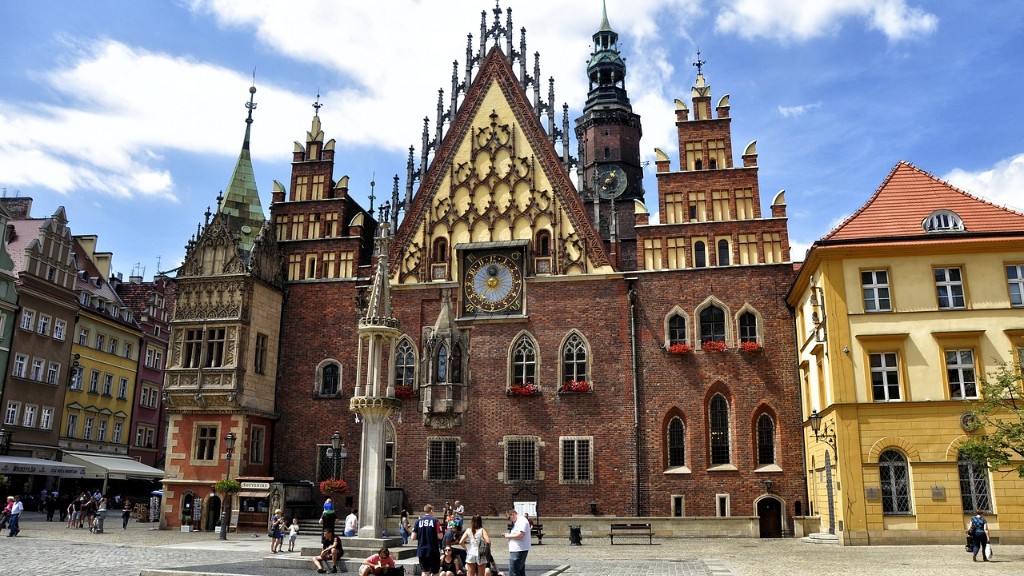Hitler’s Nazi Germany committed numerous horrible atrocities during its reign of terror throughout Europe. One of the most terrible was the construction of concentration camps in Poland during World War II, where millions of people, mainly Jews, were systematically tortured, raped, and murdered. The Nazis had a range of motivations for establishing concentration camps in Poland, most of which revolved around a desire to oppress and control the population, while at the same time exploiting their labor and resources.
Firstly, the Nazis wanted to use Poland as a launching pad for their campaign of racial extermination. Sending Jews and other undesirables to isolated Polish concentration camps allowed the Nazis to try and hide their crimes from the rest of Europe. Many of the concentration camps were built soon after the Nazi invasion of Poland in 1939, as the Nazis sought to segregate the Jewish population from the rest of the population.
These concentration camps were also used as a means of controlling the Polish population. By forcing Jews and other opponents of Nazi rule into the camps, the Nazis were able to further consolidate their hold over Poland. They also sought to use the concentration camps as a source of slave labor. The inmates at the camps were subjected to horrific conditions and were forced to labor in appalling conditions.
The Nazis also sought to use the concentration camps for political ends. By eliminating the Polish intelligentsia through mass internment, the Nazis sought to prevent any organized opposition to their rule. This strategy was used particularly in the western regions of Poland, which had been annexed by Germany as part of the Nazi expansion.
Finally, another motivation for the construction of concentration camps in Poland had to do with the Nazis’ genocidal ambitions. It is estimated that the Nazis killed more than three million Jews in Poland alone, and many of these killings occurred in concentration camps. The construction of these camps allowed for efficient and systematic killing, with prisoners often subjected to torture and forced labor before their deaths.
The Repercussions of Nazi Concentration Camps in Poland
The sheer scale of the Nazi concentration camps in Poland had devastating consequences for the population. Hundreds of thousands of people perished due to the barbaric conditions, while those who survived were often traumatized by their experiences. The concentration camps also caused significant economic disruption, as many of the resources and property of those interned in the camps was seized by the Nazis and redistributed.
The concentration camps were also a major factor in the decline of Polish political and cultural life under Nazi rule. Many of the most prominent members of Polish society were interned in the camps, leading to the repression of much of the intellectual opposition to Nazi rule. This played an important role in allowing the Nazis to dominate the population with relative ease.
The concentration camps also had an impact on religious life in Poland. The Nazis actively sought to eradicate organized religion from the country, using the concentration camps as a tool in their goal of eradicating all forms of organized religious worship. As a result, the Catholic Church suffered greatly under Nazi rule.
The horrific legacy of the Nazi concentration camps in Poland still scars the country to this day. The memory of the victims is still kept alive through memorials and museums dedicated to the memory of those killed in the camps. The lessons of these atrocities should never be forgotten.
International Persecution of Jews During World War II
The Nazi concentration camps in Poland were just part of a wider campaign of persecution of Jews during World War II. The Nazis sought to systematically exterminate the Jewish population of Europe, with millions of Jews dying in a variety of concentration camps located across the continent. These mass killings were carried out with a ruthless efficiency, and the attitude of the Nazi regime towards the Jews was one of utter disregard for their lives.
The persecution of the Jews was part of a larger campaign of racial genocide. The Nazis sought to extend their hold over Europe by targeting those whom they deemed to be of an “inferior” race. This included Jews, members of the Roma and Sinti communities, and other racial and ethnic minority groups. The Nazis sought to eradicate these groups as part of their quest for racial purity.
The persecution of Jews during World War II was also enabled by the active or passive complicity of countries and individuals throughout Europe. Many countries allowed the Nazis to carry out their persecutions with little resistance, while in some cases local populations were complicit in the mass killings. The Nazis were also able to draw on pre-existing anti-semitism to gain support for their activities.
The Nazi genocide of the Jews is one of the most shameful episodes in human history, and it serves as a reminder of the potential for evil in human society. It is imperative that the memory of the victims is kept alive, and that we strive to ensure that such atrocities can never be repeated.
The Impact of Holocaust Memory on Contemporary Jewish Life
The atrocities committed by the Nazis have left a lasting impact on Jewish life in contemporary times. The memory of the Holocaust is still kept alive in many communities, with countless memorials and museums devoted to keeping the memory of the victims alive. This has enabled Jews to keep their cultural identity alive, while also ensuring that the horrors of the Holocaust are never forgotten.
The memory of the Holocaust has also impacted upon contemporary attitudes towards Jewish people. This has led to increased awareness of anti-semitism, and a recognition of the need for vigilance in the face of discrimination. It has also made Jews more active in embracing their own Jewish identities and in standing up to prejudice.
The memory of the Holocaust has also had a profound psychological impact upon many Jews, especially those who lived through its horrors. Many survivors of the Holocaust still suffer from symptoms of trauma, while for many Jews the Holocaust serves as a constant reminder of the dangers of unchecked hatred and bigotry.
The memory of the Holocaust has also had an impact on the political landscape of contemporary Europe. The atrocities committed by the Nazis have served as a reminder of the dangers of unchecked extremism, and it is often cited when arguing for the importance of political tolerance and inclusion.
The memories of the Holocaust will never fade, and it is the duty of all of us to ensure that these memories are not forgotten. The tragedy of the Holocaust should serve as a lesson to the entire world, and to never forget the power of hatred and the strength of human resilience.
Contemporary Jewish Responses to Anti-semitism in Poland
Many of the Nazi concentration camps in Poland have been converted into museums and memorials, but this does not erase the painful legacy of anti-semitism in the country. Anti-semitism still remains a problem in Poland, with a number of extremist groups espousing views that evoke memories of the Holocaust.
Jewish organizations and individuals in Poland have responded to this issue by raising awareness of the dangers of anti-semitism. Jewish groups in Poland have organized a number of campaigns and events aimed at challenging anti-semitic attitudes and promoting tolerance and understanding. These campaigns have sought to promote a positive image of Jews in Poland, and to challenge stereotypes and prejudice.
Jewish organizations in Poland have also sought to emphasize the cultural and historical contributions of Jews to the country. Many Jewish organizations have organized events that celebrate Jewish culture and history, and which showcase the accomplishments of Jewish artists, writers, and thinkers in Poland.
Jewish organizations in Poland have also sought to engage with the mainstream political discourse in the country. Jewish groups have organized a number of campaigns aimed at getting politicians to address the issue of anti-semitism. These campaigns have sought to persuade politicians to take a firm stance against anti-semitism and to promote an ethic of diversity and inclusion.
Jewish organizations in Poland have also sought to reach out to non-Jewish citizens of the country. Many of these organizations have sought to bridge the divide between Jews and non-Jews, and to promote mutual understanding and respect. This has included events that bring Jews and non-Jews together and encourage dialogue and exchange.
Contemporary Responses by the Polish Government
The Polish government has also sought to address the issue of anti-semitism. The government has taken a number of measures to combat prejudice and discrimination, such as launching awareness campaigns and monitoring hate speech. The government has also sought to promote understanding of the Holocaust, with the government initiating several memorials and museums to commemorate the victims.
The government has also sought to engage with Jewish organizations in Poland, meeting with leaders of the Jewish community to discuss how to best address issues related to anti-semitism. The government has also sought to ensure that the laws of the country are enforced, and that anyone found guilty of promoting anti-semitic views is punished.
The government has also sought to recognize the positive contributions of Jews to Polish society. This has included honoring prominent Jewish figures in Poland, such as the late Prime Minister Tadeusz Mazowiecki, and launching a series of initiatives aimed at promoting Jewish culture and heritage.
Finally, the government has also sought to address the issue of anti-semitism in schools. This has included introducing educational initiatives designed to promote tolerance and understanding, as well as introducing stricter punishments for those found guilty of hate speech.
The Future of Jewish Life in Poland
Jewish life in Poland is still very much alive, and the country has a vibrant and diverse Jewish community. Jewish organizations in Poland have sought to celebrate Jewish culture and history, and have sought to engage with the wider population in order to promote mutual understanding and respect. The Polish government has also taken steps to ensure that anti-semitism is not tolerated, and has sought to promote tolerance and understanding.
However, there is still much more work to be done in order to ensure the continued health and prosperity of Jewish life in Poland. As the memory of the Holocaust fades, it is imperative that the lessons of this dark period in history never be forgotten. The memory of the victims must be kept alive, and all forms of discrimination must be confronted and rooted out.
The future of Jewish life in Poland will depend on a collective effort from both Jewish and non-Jewish citizens to ensure that Jewish culture and values are maintained, and that anti-semitism is firmly and permanently rejected. Only then can Poland truly move forward and become a country of tolerance and inclusion.





